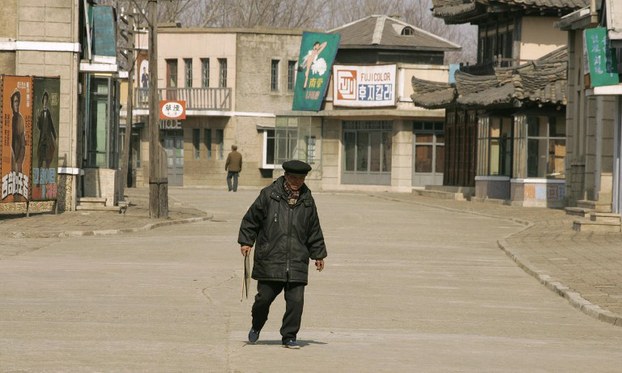North Korean television ends broadcast of Russian, Chinese films
| Publisher | Radio Free Asia |
| Publication Date | 30 December 2014 |
| Cite as | Radio Free Asia, North Korean television ends broadcast of Russian, Chinese films, 30 December 2014, available at: https://www.refworld.org/docid/54b794a112.html [accessed 21 May 2023] |
| Disclaimer | This is not a UNHCR publication. UNHCR is not responsible for, nor does it necessarily endorse, its content. Any views expressed are solely those of the author or publisher and do not necessarily reflect those of UNHCR, the United Nations or its Member States. |
2014-12-30
North Korea's state television station has stopped broadcasting Chinese and Russian films as part of a bid to protect the reclusive nation from foreign influences, according to sources inside the country.
 A man walks through a deserted film set at the Korean Feature Film Studio just outside Pyongyang in a file photo. AFP
A man walks through a deserted film set at the Korean Feature Film Studio just outside Pyongyang in a file photo. AFP
The sources from North Korea's capital Pyongyang told RFA's Korean Service that the official Chosun Central Television station recently ended its regular weekend broadcast of films from China and Russia following a directive from regime leader Kim Jong Un, despite stable relations with the two nations.
"These days, no foreign films are broadcast and we can only watch reruns of domestic movies," said one source who spoke on condition of anonymity during a recent trip to China.
"The state stopped broadcasting foreign movies because of an order from Kim Jong Un to block the influx of foreign culture," he said.
The source said that while Chosun Central Television had stopped broadcasting films from China and Russia, DVDs of Russian movies distributed by North Korea's state-owned Mokran Video company were still available for purchase at local marketplaces.
"Anyone can still buy Russian movies made by Mokran Video at the market, so there are some who accuse the state of using a double standard to generate income from the people by continuing to sell the DVDs," he said.
Films and foreign affairs
A second source from Pyongyang said residents of North Korea often try to deduce the state of the country's relations with other nations based on what foreign films are being broadcast on official television.
"Chinese movies were rarely broadcast after relations between North Korea and China soured two years ago and instead we were usually shown old films produced by the Soviet Union, but nowadays not even those are played anymore," the source said.
He said that North Korea had broadcast Chinese films when relations with China were stable, just as Russian movies were shown during times of good relations with Russia.
"It's unclear why state television has stopped broadcasting Russian films, despite recent good relations between Pyongyang and Moscow," he said.
The sources said that North Koreans who earn a decent living can afford to purchase Russian films distributed by Mokran Video, which are sold for around U.S. $0.80 per feature-length DVD.
But they said that due to frequent electricity outages caused by North Korea's aging and overburdened power grid, people are forced to watch the DVDs on small televisions or laptops operating on solar-powered storage batteries.
Forbidding foreign media
North Korea's government maintains an iron grip on the flow of information in the country, where citizens are punished for accessing foreign radio and other media.
North Korean authorities have long tried to block South Korean soap operas, movies, and music from entering the country in an attempt to keep unwanted foreign influences from seeping into the Hermit Kingdom.
In November last year, authorities publicly executed some 80 people in a wave of capital punishment across seven cities, many of them for watching foreign media, South Korean media reported.
Reported by Joon Ho Kim for RFA's Korean Service. Translated by Hanna Lee. Written in English by Joshua Lipes.
Link to original story on RFA website
